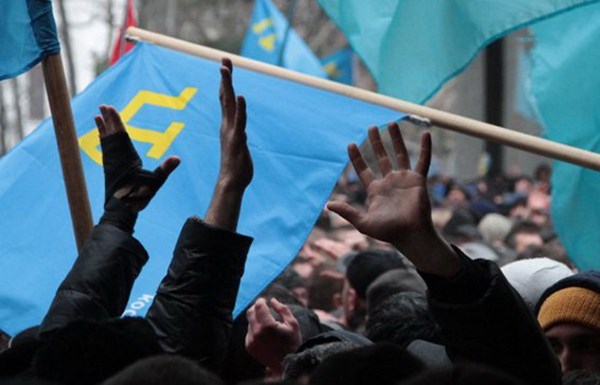Ukraine to commemorate Day of Resistance to Occupation of Crimea and Sevastopol
During the opening of the Age of Crimea 2020 forum, Ukrainian President Volodymyr Zelensky announced that Ukraine will have a new national date – the Day of Resistance to the Occupation of Crimea and Sevastopol.
The head of state noted that on this date six years ago, the largest gathering in support of the integrity and unity of Ukraine was held in Simferopol.
“In recognition of the bravery and heroism of all the rally’s participants, I am signing a decree today on the Day of Resistance to the Occupation of the Autonomous Republic of Crimea and the City of Sevastopol. This day will be commemorated annually on February 26,” Zelensky’s press service cites him as saying.
The president remarked that restoring Crimea to Ukraine is not only his goal as the country’s leader, it is also the citizens’ position.
“It’s not just our shared dream. It’s a pledge of security on the planet. It’s a restoration of faith. Faith in international law and justice,” he observed.
The president emphasized that the global community supports Ukraine in its fight for the restoration of Crimea.
“In this regard Ukrainians are completely united. Consequently, the restoration of Crimea is an undeniable part of our national idea,” he said.
Volodymyr Zelensky expressed certainty that the day will come when Ukrainian athletes and artists will go back to Crimea, and the Mejlis of the Crimean Tatar People will return to its rightful building in Simferopol.
“All of this is bound to happen. The whole world is interested in it. Because a full-fledged end to the war is going to occur in the Donbas. And full-fledged peace will come to Crimea,” Zelensky predicted.
The president said that the Ukrainian government is doing all it can to have the blue and yellow flag raised in Crimea again. He also pointed out that there are things which can and should be done today.
“First and foremost, supporting the citizens who live in Crimea or have Crimean registration,” he said.
He also promised to improve the ways of entering the annexed territory.
“It must be a comfortable, safe, illuminated country, with normal roads and, excuse me for saying, with working toilets. That’s why we’ve paid such attention to providing comfortable checkpoints for entering and exiting. And we have done it. At the same time, despite their attractiveness, I want to emphasize: They are temporary structures. Apart from that, by the end of the year, the government in conjunction with the company SOCAR will open a large hub for serving citizens at Chonhar. There will be a full-fledged center for providing administrative services, a recreational area and other important amenities,” said Zelensky.
Mustafa Dzhemilov, Leader of the Crimean Tatar People, thanked the president for the initiative and for signing the decree. He pointed out that the text of the decree was put forward by nearly one third of all the members of the Verkhovna Rada from all the parties of parliament.
In February 2014, armed people in uniforms without insignias appeared in Crimea and captured the Supreme Council of Crimea, the Simferopol Airport, the Kerch ferry crossing and other strategic objects, and prevented the Ukrainian army from taking action. Initially, the Russian government refused to acknowledge that these armed people were Russian soldiers, but President Vladimir Putin later admitted it.
On 16 March 2014, a referendum on the status of Crimea was held in Crimea and Sevastopol, in which the inhabitants supposedly voted for the peninsula to become part of Russia. The outcome of the so-called referendum is not recognized by Ukraine, the EU or the US. On 18 March, Putin announced the “annexation” of Crimea to Russia.
International organizations have declared the annexation illegal and condemned Russia’s actions. Western countries have imposed economic sanctions on Russia in connection with the annexation. Russia claims to have “restored historical justice”. Ukraine’s parliament, the Verkhovna Rada, declared 20 February 2014 the start of Russia’s temporary occupation of Crimea and Sevastopol.
